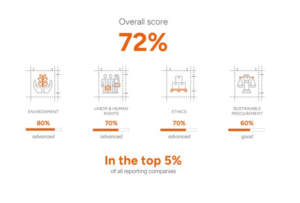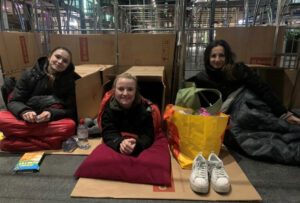Implementing circularity in a sustainable workplace
“Net zero carbon emissions remains one of the biggest challenges we face. Businesses need to get to grips with this and how it fits into the workplace.”
This is one of the reasons we brought together a diverse panel of experts for The Circular Economy Week London 2020.
Crown Workspace’s Head of Sustainable Development, Ann Beavis chaired a webinar with guest speakers: Julie Hogarth, Head of Sustainability JLL, The Crown Estate Central London Portfolio; Gerrard Fisher, Partner, QSA Partners; and Phil Oram, Regional Director, Crown Workspace. We are sharing insights from the webinar, so you can learn how our experts have successfully implemented circularity in their workplace.
The difference between sustainability and circularity
Sustainability comes first. However, as businesses create targets to improve their environmental performance or reduce their carbon impacts, strategies are needed to deliver their goals. This is where the circular economy comes in.
Where to start when going circular
Firstly, start with a scoping exercise – identify your quick wins which won’t involve too many knockbacks. One of our clients, JLL (Property management company) looked at their operational waste before moving on to other challenges:
- Review what’s thrown away
- The opportunity that presents
- And, if there is a market that values what you no longer want.
JLL started by sending food waste to anaerobic digestion instead of landfill. The food waste gets converted into biogas and fertiliser for the land, giving a great story to tell occupiers. It also helps people to really understand the importance of separating food waste from general waste, giving a greater chance of an initiative succeeding.
As companies move in and out of JLL’s central London office space, they create redundant assets. JLL set up a partnership with Crown Workspace to take the redundant furniture and encourage their tenants to use remanufactured and refurbished office furniture. JLL also lead by example by refurbishing their office with remanufactured and refurbished office furniture.
Circularity builds resilience
It’s vital for businesses to not just focus on making money but to also think about circularity, as this will build resilience, almost without fail. Gerrard Fisher shared how recovering products can give a business stock and working capital, protect that businesses from supply chain shocks and give confidence in their ability to service the market when there’s an interruption.
Crown Workspace has also seen the benefits of resilience provided by circularity during the COVID-19 outbreak. With good stock levels of office furniture and IT equipment, we have been able to provide a quick turnaround on orders. On the other hand, companies selling new products are experiencing up to twelve-week lead times due to delays with manufacturing.
Circularity and social value
Implementing circular economy principles can have a dual purpose in both reducing waste and supporting local communities. The social benefits from circularity are very significant and include:
- Job creation
- Upskilling of the workforce
Circularity and social value are closely linked, giving even greater return from keeping resources in use for longer and eliminating waste.
JLL has a partnership with Crown whereby laptops and computers that are no longer required are sold on for reuse or given to their chosen charity through our Giving Back Project.
The challenges in implementing circularity
Implementing circularity in the workplace can present a range of challenges, but consider the following:
- Learn from others: Businesses already implementing circularity need to share their knowledge and experiences through webinars, best practice reports and other speaking events, translating the benefits in real business terms.
- Understanding customer needs: Many businesses understand certain elements of customer needs but not the whole picture. They need to be willing to explore different customer needs and bring a model to market that meets these requirements.
- Innovation is key: not just in terms of the products they sell but throughout the business. Mistakes will be made but it’s all part of the process as it evolves.
Covid-19 and future of workplace
There’s a firm view that sustainable and responsible business practices will be at core of the recovery. It’s apparent that people are reassessing their values as a result of Covid-19 but whether that will result in long term behaviour change is still to be seen.
What is evident is that customer needs are changing.
- How do you service the workplace when most of the workforce are working from home?
- What facilities that they access in the office do employees need at home?
- How do you get these products and services to them?
Businesses need to work out quite quickly how to meet those needs, and there’s a huge opportunity for circularity in doing so.
The transition back to the workplace is on everyone’s agenda with a fear of the number of staff that can be brought back, how social distancing can work and indeed how employees can even get to work.
A final word of wisdom from each of our panellists and Chair
“Never accept no for an answer. It might be no at one point but in a year’s time, it might be yes let’s do it. We have just done a completely circular fit out in Manchester, it’s all possible.”
Julie Hogarth, Head of Sustainability JLL, The Crown Estate Central London Portfolio
“Learn what customers really need, come up with ideas that address those needs, test really quickly and improve. It’s the only way to get the right business model, the quicker you do it, the quicker it will lead to greater profitability.”
Gerrard Fisher, Partner, QSA Partners
“The age of the workforce is reducing, listen to your employees and your kids. They are really educated in what we should be doing. Circularity and sustainability are key factors they are interested in when looking for new employer. If you want to retain that value and talent, you must take this seriously”.
Phil Oram, Regional Director, Crown Workspace
“Implementing circularity takes bravery and leadership but with momentum and good advice, now is a great time to reflect on what businesses do, how they operate and the procurement decisions they make. We need to create better products from sustainable sources, design products and services to ensure longevity, and use these more efficiently and share. It’s very simple really!”
Ann Beavis, Head of Sustainable Development, Crown Workspace
Our panellists were hopeful that businesses and government won’t take their eye off the sustainability ball and that Covid-19 presents an opportunity to harness for good. The webinar showed that circular business models can deliver more resilient supply chains, increased wellbeing and social good as well as greater profit. It doesn’t need to cost more to do the right thing, and in many cases it can cost less. We need to continue with the journey we are on and build back better after the Covid-19 lockdown.
Find out more about our services here or you can watch the full webinar recording here.
Related stories
Sustainability remains a top business priority for Crown in the UK & Ireland and globally; we are therefore delighted to have launched our 2023 UKI Sustainability Report!
Crown are delighted to announce that we have been awarded Gold by EcoVadis in 2024 for the second time, reflecting our commitment to and progress in becoming a responsible business.
We supported both Landaid and the YMCA with cardboard boxes for their annual sleepout events. We were incredibly pleased to deliver 1,100 boxes as well as bring along a group of volunteers to the YMCA event.



















